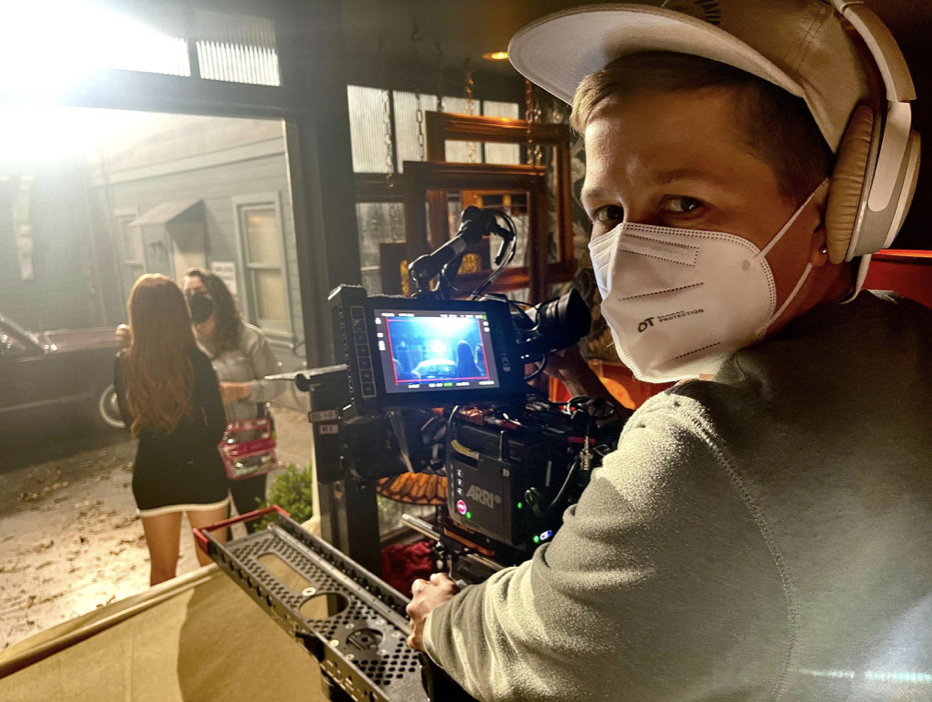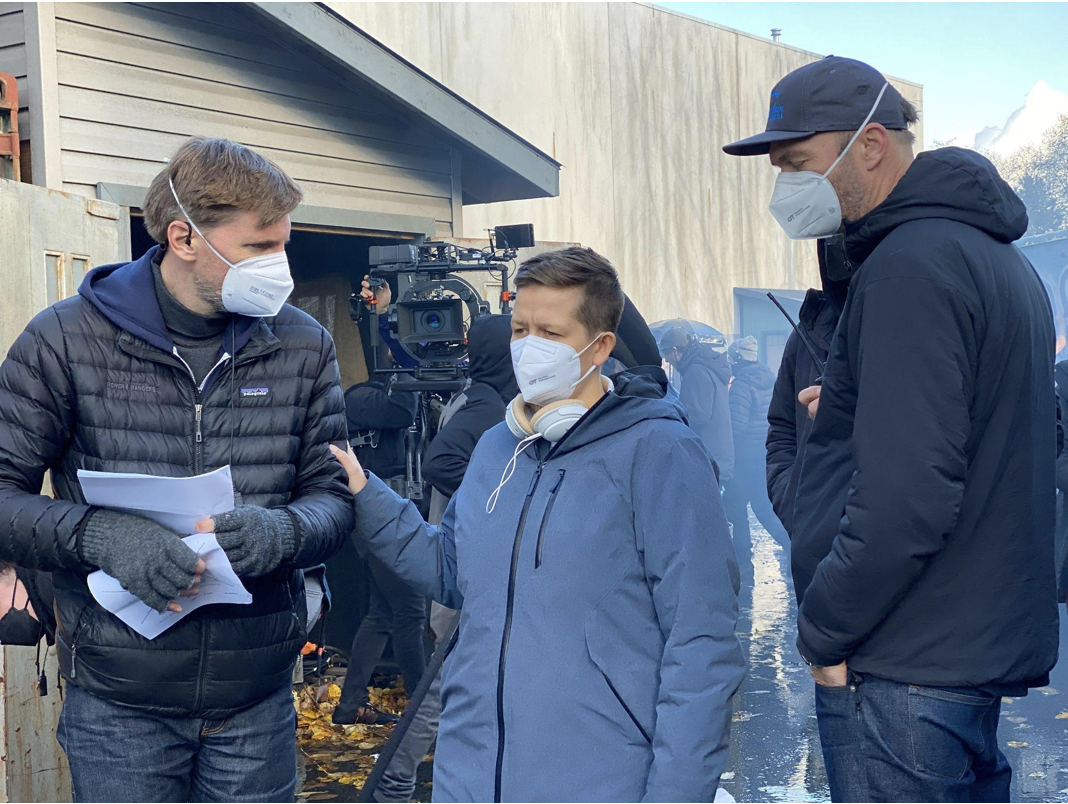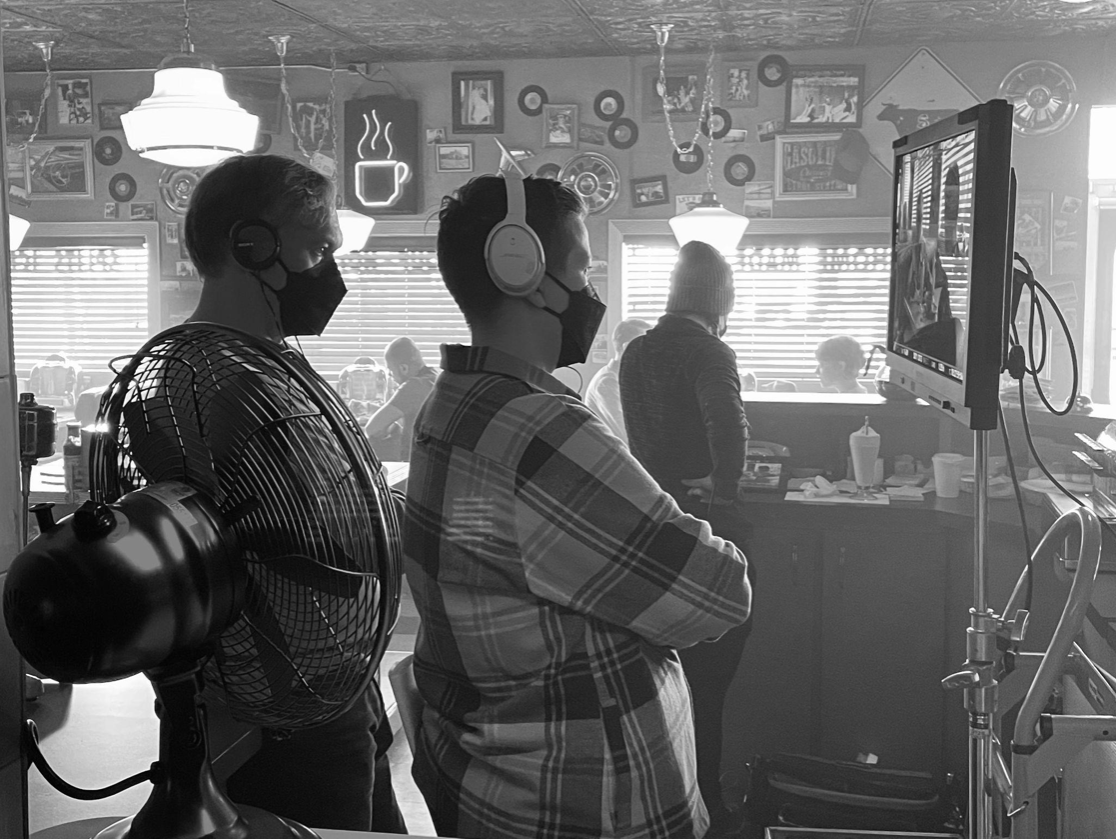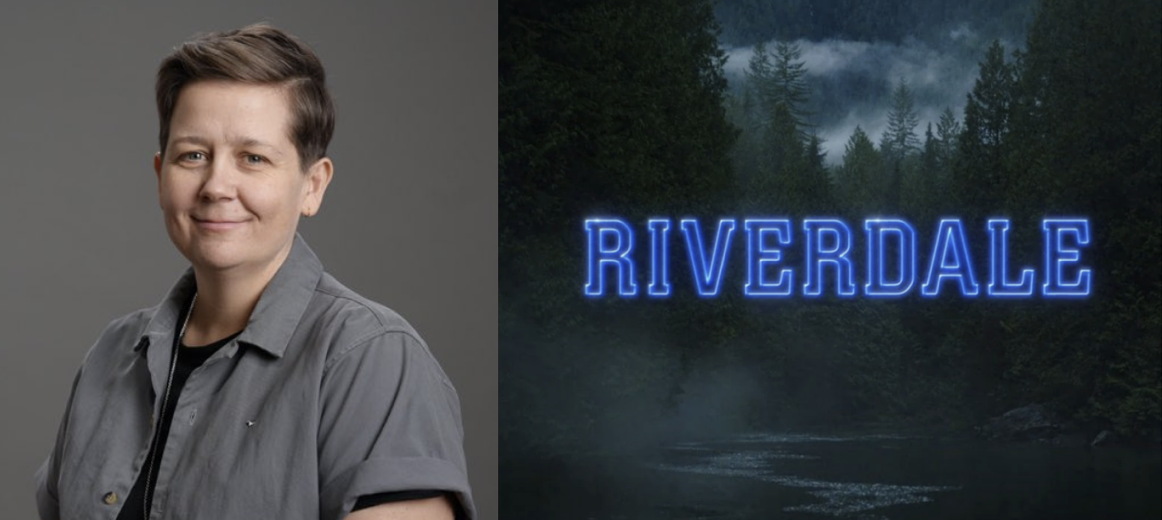A common occurrence in most film schools is everyone in the class saying that they want to become film directors when asked about their career ambitions at the start of the year. The trials and tribulations of the following semesters usually separate the dreamers from the doers, often as students end up falling in love with one of the many crafts (cinematography, production design, or in my case, film editing).
I’m still editing these days, having moved up after years of assisting. Most of my fellow classmates have either moved on from the film industry or never entered it in the first place. One who has stuck it out however has not only enjoyed nearly a decade as a successful and sought-after script supervisor, but has also recently made the daunting leap to the director’s chair.
Her name is Tara Dafoe, a name you may already be familiar with if you’re a fan of the long-running and recently-concluded CW series Riverdale. She had been script supervisor on the show starting in Season 2 until midway through Season 6, she got the chance to direct her own episode. It was so well-received that she returned to direct two more, including the show’s penultimate episode which just recently aired.
I recently caught up with my former classmate to discuss her career since film school, how she made that impressive jump to the director’s chair, and how the recent Hollywood strikes have affected her most recent directing job.
The following interview has been edited and condensed for length and clarity.
Can you tell us a little about your background and how you got into film?
I’m from Calgary and I briefly spent time at Red Deer College taking the Motion Picture Arts program. I didn’t end up completing that because I ultimately ended up moving to Vancouver to attend Vancouver Film School in 2013. I graduated in 2014 and started working basically two days after graduation!
Tell us about your first job in the industry.
One of my biggest pieces of advice in film school was to never turn down work when you first graduate because it takes a long time to get that first job. I got a call from one of the teachers about an indie feature looking for a script supervisor. I had taken the script supervising courses along with you and everybody and I was like “Sure, sign me up!”.
It was a little indie feature called Songs She Wrote About People She Knows. Funny story about that is that one or two years ago I got a cheque in the mail for $500 from that movie at Christmastime!
For the uninitiated, can you describe the role of a script supervisor?
I’d say the script supervisor is the right-hand person to the director and the direct line of communication between the editor and the director. We relay all of the shots, print takes, circle takes, directors notes, and we send all of that information to the editor so that they can have a more cohesive time editing the show together.
We’re also in charge of actor’s dialogue and continuity on set, which is any actor “action”. If they take a sip of a drink, do a twirl, sit in a chair, take a jacket off, we’re in charge of reminding them what they did and when they did it.
How did you come to work on what is arguably your largest show, Riverdale?
I worked on a show called Aftermath with an amazing producer, Connie Dolphin. She got on Riverdale and I hadn’t yet been sworn into (IATSE) 891 yet. She said she wanted to bring me onto Riverdale and that I’d have to interview with the showrunner, Roberto Aguirre-Sacasa.
So I talked to Roberto and he said “Can you make the actors say their lines and do continuity?”. It was a weird question since that’s basically the job so I said “Sure I can” and he said “Great! We’ll give you a shot”.
I noticed that you seemed to be credited for about half the episodes on any given season (every other episode). Can you describe the process of working on a large network TV series?
Because it’s ten months of filming and each episode takes about 8-10 days to shoot, we alternate. There’s a number of positions that alternate: script supervisor, props person, cinematographer, 1st A.D, etc. So I would get my three days of prep and then I would start shooting. While we’re shooting, the other script supervisor is prepping. So once their episode starts, I would get a couple days off and then start my prep.
Prep involves the breakdown of the script, continuity one-liner, production meeting, tech survey, and script timing where we “time” the episode to make sure it’s running within the length that we want it to be for air. Then once my prep days are done, my episode starts shooting and I go back to set.
Where in BC did Riverdale primarily shoot?
Langley. In season 2, we were on location a lot more. I think Veronica’s apartment was in Vancouver. But by the last few seasons, I can think of probably ten or twelve episodes in a row where we didn’t leave the two studios in Langley.

After several seasons of doing continuity, you had a chance to direct an episode in Season 6 (Chapter One Hundred and Two: Death at a Funeral). How did this shot at the director’s chair come about?
First of all, I know how fortunate I am. It’s not an easy jump. I know script supervisors who have worked a long time and have never gotten the opportunity. So I know how fortunate I am that Riverdale’s showrunner Roberto was gracious enough to even hear me out.
Basically during the COVID season (Season 5), I was not alternating for the first time. There were so many question marks and they wanted to limit the number of crew and testing and all that. We really didn’t know how long we would be back for. We were the first show to go down and the last show to come back.
So when we came back, I was working by myself. I was prepping on weekends and shooting every episode. As we were shooting, being on set all the time, I had this different kind of connection to the crew and the show. I wasn’t getting my away time to play sports and see my family, I was really just all-immersed in the show.
I’ve always wanted to direct. As I was on the show more, I was watching all these directors come and go and I said to our producing director Gabriel Correa one day “I want a shot. What do you suggest I do?”. He said “Keep doing what you’re doing. You’re basically shadowing directors each and every single day and I think you should shadow me in prep”. So I started doing that. Just taking a keen eye on every director that came in: the good, the bad, and the ugly. I was learning and asking more questions than I ever had before.
During the off-season I shadowed our producing director when he edited our finale. Then when we were coming back for Season 6, I shadowed him in prep for the first two episodes. Then he said that I needed to call Roberto and tell him that I was interested in directing.
So I called Roberto’s assistant to set up a meeting and he said that Roberto would call me the next day between 9am and 5pm. That was a long window (laughs)! So I sat and waited and waited until I got a text at 4:45pm saying that he wouldn’t be able to call that day.
So we did that for a few days and then I said to myself that it was summer and we didn’t start up for a couple months and that I should just text him just to take the pressure off.
Three months go by, we’ve now started Season 6, and I was told Roberto was coming up for episode 4. The day before he came back up, he finally texted me back. I mean, he’s a busy guy, I wasn’t upset or offended. He’s running multiple shows and living in another country, but he must’ve had a jolt in his memory.
He came the next day, saw me, gave me a big hug, and then he pulled me aside and I just put it out there. I said “Roberto, I’d love a shot. I love you, I love your show, and I can promise you I’ll work my ass off if you give me a chance”. He said “Well, I’ll see if I can make your dreams come true”.
That was during episode 4 and he called me during episode 5 and said “do you want to direct episode 7?”. I said “Holy shit, that’s fast! Okay, yep!”. Then I started panicking (laughs).

Can you walk us through the process of directing an episode?
You have to get your script by midnight on the night before you start prepping. I got my script at 11:40pm (laughs). Sometimes they come early, but not in this instance! I was laying awake and I kept hitting refresh on my phone and I saw the script come in. The first thing I did was open it and then scroll to the last page to see how many pages it was. It was 71 pages!
I thought it had to be a prank. We’re a 42 minute show. We typically want a 50 page script and here I am with a 71 page script. So of course I didn’t sleep.
Anyways, I woke up early and I read the script. Definitely a first draft. Then I got a text from Roberto. He said not to worry and that he was gonna do his pass that day and that it would be a lot tighter. I think the process in some of these rooms is that a couple writers write for Archie, a couple writers write for another character, I’m not sure exactly how. But it’s not cohesive until the writer of the episode or the showrunner does their pass and cleans it all up.
So I got another script later that day and it’s down to 58 or 59 pages. First day of prep is reading the script, familiarizing yourself, and writing any preliminary notes you might have. Day 2 is the concept meeting where the showrunner will go through the whole script and relate what he thinks is the concept of the episode and you can ask him any questions you have at that time.
Moving forward, you get your prep memo from your 2nd AD which lays down all of your meetings for the week of prep: props meeting, special effects, stunts, VFX, hair & makeup, wardrobe, scheduling, shot listing, all the meetings from all the departments that need their questions answered.
As a director, you have to provide these answers. How do you want this stunt to happen? How do you see this special effect? How much blood do you see? Is their hair messy? Should they be in the same costume? You’re just answering a lot of questions.
Once prep is done, you do a tech survey where you go through every single scene and location and talk about logistics. The cinematographer and production designer talk to their teams and make sure everything’s gonna be in place on the day of shooting. You as a director will tell everyone which way you’re gonna be looking, the shots you have planned, so that all the departments are ready for when you arrive to shoot on the day.
The big meeting is the production meeting. The 1st AD will run that meeting for us and we’ll go through everything scene-by-scene. It’s just kinda last looks for everyone if they have any final questions or notes. The very last meeting is a smaller, much more intimate meeting with the showrunner, producer-director, editor, sometimes the script supervisor. This is a very vital meeting for the director. You understand the showrunner’s tone, what he wants to see in this episode. Is it emotional? Is it funny? Whatever the tone may be for that episode. I find that meeting to be very valuable as a director who wants to be there for the actors.
And then you go to shoot!
You had been with the show several years, so the cast and crew were already familiar with you. How did that dynamic affect your directing during the shoot? Also, any particular challenges you had to deal with?
There were definitely logistical challenges. We had one scene outside and the back alley flooded the day we were supposed to shoot that scene! One day I had a particular actor in every single scene and they got sick so we had to force majeure (Act of God). It was something out of our hands and we were unable to shoot. I had a cast break-up during my episode (laughs) and they were in every scene together so that was a thing to navigate as a director. Even though it’s not my business, I’ve known these guys for a long time. So I love them not just as actors, but as people that I’ve known in my life. So that was something to navigate, handling their personal emotions delicately with what we were shooting.
One funny thing: I was directing Lili who plays Betty Cooper in one of our first scenes. She came up to me after the first take and whispered in my ear and said “don’t cut so fast, let it breathe a minute”. I was so nervous so right when the line was done I was like “CUT!”. So little things like that, they’d remind me. Those are invaluable beats. If you don’t cut so fast, there are these golden moments after the script has ended.
But overall, it was the best experience of my life. This is a group of people that I’ve known and become close friends with that were so happy for me and so supportive. I couldn’t have asked for a better first-time directing experience, truly.
Our key make-up, Jules, had people taking a bunch of photos of me so she could make me a little scrapbook at the end, which she always does with first-time directors. So there were just a lot of nice things and moments doing it with a group of people that already know and love you. I wouldn’t trade it for the world.
While Riverdale shoots in BC, it is edited down in California. I assume you worked remotely, so what was that process like?
Yeah, I worked remotely, obviously because of COVID. Truly prep and post were the most challenging for me in this whole process of directing network television for the first time. They were the most unfamiliar.
The editors at least had an idea of who I was because I emailed them every single day when I was script supervisor. Even though we didn’t know each other, they were still so supportive that a member of the regular crew was getting this shot.
I think for my first episode, I had this mindset that I needed to change something in every single scene, in every single take, because I had to put my imprint on it. But as I was going through the process, I think the editor said something to me like “if it’s working, it’s okay”. That was good to know, because I felt like having no experience whatsoever editing network television. I was thinking “are they gonna think I don’t know what I’m doing if I don’t change something?”.
But as I settled into that and I would watch a scene with the editor and I’d be feeling the feels, and the lines were there, I was getting better at realizing what was working and we would carry on. So that first day was a pretty long and intense day if I remember because I didn’t have the proper vocabulary so he taught me some of that vocabulary of how to communicate to an editor so that they understand faster. As I’ve gone on, it has gotten a lot easier.

The first episode you directed aired on March 27, 2022. What was it like seeing the final episode and what was some of the feedback you received?
It’s interesting, because when the episode was done and I was back on the floor, it was kind of like it never happened in a way. It was so weird. You don’t hear from anybody for a long time. Then I got this email that said “06×07: no edit notes”. I figured that had to be a good sign that they didn’t want to change anything.
Traditionally, our Riverdale episodes run long, so our showrunner always has to cut them down to time, so I knew that would happen. But the network seemed pleased. They had no notes for the episode. Then I finally got a text from our producer that said “Did you see? The network loved it! Roberto loved it and he’s very happy!”. That’s kinda it.
But obviously so cool to see the trailer coming out and being like “Woah, I directed that!”. Then the cast was posting and sharing photos from behind the scenes. It started to become very exciting and feel very surreal. I had fans messaging me and it was just a very surreal thing.
I did finally hear from Roberto months after it aired that he loved it and he’d been meaning to text me. So it all happened, but just very slowly.
When you shot your most recent episode (Chapter One Hundred Thirty-Six: The Golden Age of Television), the still-ongoing writers strike was already well underway. How did that affect production?
It was weird. I know it was really important for the writers room to finish the script in time because the show was ending. They had already announced that the show was ending so had they not gotten it done in time, it would have felt like this really weird jolt in time and it would have always been incomplete. I don’t think they would’ve come back to it.
So they worked so hard, big kudos to them. They hammered out a lot of scripts very fast and they were amazing. The scripts were all so amazing this season.
So in a way, it was great as a director, when I found out which episode I was getting. We kind of shot out of order. Starting with episode 12, I don’t think anything was shot in order except for the finale which was shot last (laughs). Everything was literally shot out of order. I did episode 19, but I shot it in the episode 18 slot.
We had the script so early. So I had already read my script and still didn’t shoot for over a month! I didn’t even have prep for over a month. So by the time we got to prep, I had read the script five or six times, I could almost recite the lines. So in a way, it was helpful. It was a big bonus that as a script supervisor, I had all the scripts until the end of the season way before we were shooting them. So I knew what was coming and I had a heads up on continuity.
But as a director, I was already thinking “Oh, what’s a cool shot we could do? What about a lighting effect? What about this?”. I had been able to put so much time and thought into what I wanted to do for my final episode. It’s my favorite episode that I’ve directed. It’s obviously very special, being the penultimate of the series.
I admit it’s a tad awkward asking this in the midst of dual Hollywood strikes, but now that Riverdale has concluded, have any future prospects for directing made themselves known?
Nothing concrete. I’ve had a couple meetings with Netflix, I’m having a meeting with Freeform. Obviously Roberto and I have kept in touch. He runs a show called Pretty Little Liars.
So I think that there’s some hopeful prospects, let’s say. But with the strikes happening, there’s really not much going on. So I’m actually just flexing my writing muscle again. It’s been so long since I’ve been on Riverdale and so much real life has happened as well that I haven’t had an opportunity to just sit with time on my hands to write, so I’m working on that.
It’s maybe a great time for some Canadian content, so I’m looking at making some of my own stuff and just kind of going with the flow.
Any advice you’d like to impart to aspiring directors?
I would say that if you want to direct, you have to put yourself out there. You have to have these hard conversations. When they told me that I needed to talk to Roberto, I was nervous. I was thinking “How many people bombard him with this?”. But had I not had that hard conversation, I wouldn’t be here today, having three episodes of Riverdale, finally feeling like I’m doing what I’m meant to be doing and really enjoying it.
Also, watch a lot of shows. There’s so much content out there. Find out what you like, what you wanna make, and then go for it!
Riverdale can currently be streamed on Netflix.
Tara’s episodes are:
06×07 – Chapter One Hundred and Two: Death at a Funeral (aired March 27, 2022)
06×16 – Chapter One Hundred and Eleven: Blue Collar (aired May 29, 2022)
07×19 – Chapter One Hundred Thirty-Six: The Golden Age of Television (aired August 16, 2023)


So happy for you Tara!!!! Great job!